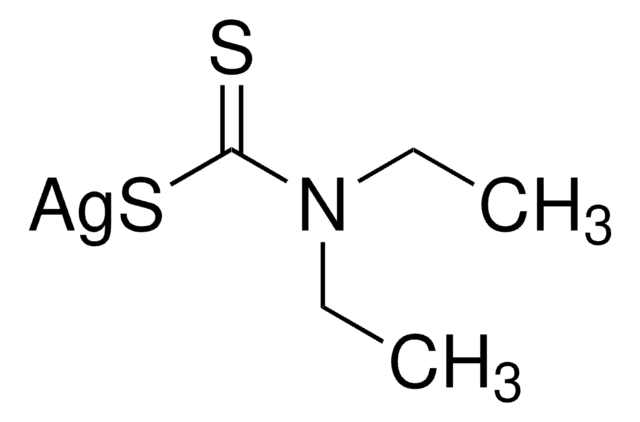1.01515
Silver diethyldithiocarbamate
for analysis EMSURE®,Reag. Ph Eur
Synonyme(s) :
Silver diethyldithiocarbamate, Diethyldithiocarbamic acid silver salt
About This Item
Produits recommandés
Agence
reag. Ph. Eur.
Niveau de qualité
Gamme de produits
EMSURE®
Pureté
≥99 % ((DSC (differential scanning calorimetry)))
Forme
solid
pH
5.0-6.5 ( in H2O, suspension)
Pf
178-183 °C
Masse volumique apparente
340 kg/m3
Température de stockage
2-8°C
Chaîne SMILES
CCN(CC)C(=S)[S-].[Ag+]
InChI
1S/C5H11NS2.Ag/c1-3-6(4-2)5(7)8;/h3-4H2,1-2H3,(H,7,8);/q;+1/p-1
Clé InChI
NSVHDIYWJVLAGH-UHFFFAOYSA-M
Catégories apparentées
Application
- Arsenite tolerance and removal potential of the indigenous halophilic bacterium, Halomonas elongata SEK2.: This study explores the application of silver diethyldithiocarbamate in bioremediation, specifically its role in enhancing arsenite removal by Halomonas elongata SEK2. This research provides insights into the potential of using complexed silver compounds in environmental cleanup efforts, particularly in saline environments where traditional methods may fail. The findings could significantly impact wastewater treatment and environmental sustainability practices (Tavoosi et al., 2024).
- The development and use of an innovative laboratory method for measuring arsenic in drinking water from western Bangladesh.: This paper details the use of silver diethyldithiocarbamate in a novel analytical method to measure trace levels of arsenic in drinking water. This development not only enhances the accuracy and sensitivity of arsenic detection but also demonstrates the critical role of silver diethyldithiocarbamate in public health monitoring, offering a significant improvement over traditional testing methods (Frisbie et al., 2005).
- Methods of analysis for toxic elements in food products. 2. Review of USSR standards on determinations of heavy metals and arsenic.: This review discusses various methods, including the use of silver diethyldithiocarbamate, for the analysis of toxic elements in food products. The article highlights the importance of stringent quality control in food safety and the role of advanced chemical reagents in ensuring the reliability of detection methods in the food industry (Skurikhin, 1989).
Remarque sur l'analyse
Identity (IR-spectrum): passes test
Appearance of solution (in pyridine): passes test
pH-value (aqueous suspension): 5.0 - 6.5
Melting range (DSC (differential scanning calorimetry)): 178 - 183 °C
Spec. Absorptivity A 1%/1cm (of the As-complex; 525 nm; 0.00033 %; 1 cm; pyridine): ≥ 1500
Nitrate (NO₃): ≤ 0.01 %
Loss on Drying (105 °C): ≤ 0.5 %
Sensitivity (for determination of arsenic): passes test
Informations légales
Code de la classe de stockage
11 - Combustible Solids
Classe de danger pour l'eau (WGK)
WGK 3
Point d'éclair (°F)
Not applicable
Point d'éclair (°C)
Not applicable
Certificats d'analyse (COA)
Recherchez un Certificats d'analyse (COA) en saisissant le numéro de lot du produit. Les numéros de lot figurent sur l'étiquette du produit après les mots "Lot" ou "Batch".
Déjà en possession de ce produit ?
Retrouvez la documentation relative aux produits que vous avez récemment achetés dans la Bibliothèque de documents.
Les clients ont également consulté
Notre équipe de scientifiques dispose d'une expérience dans tous les secteurs de la recherche, notamment en sciences de la vie, science des matériaux, synthèse chimique, chromatographie, analyse et dans de nombreux autres domaines..
Contacter notre Service technique






